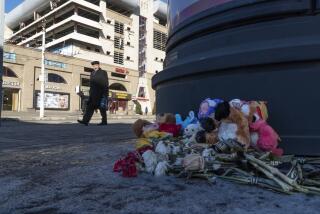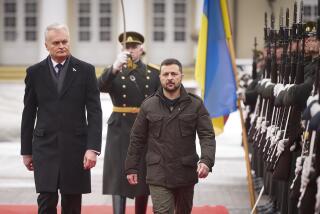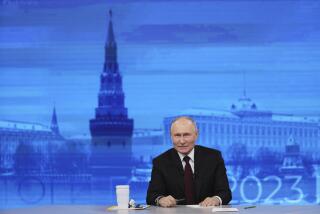Invading may be President Vladimir Putin’s Plan B in Ukraine
Russian President Vladimir Putin has massed tens of thousands of troops along Ukraine’s eastern border, a reminder of his vow to protect ethnic Russians in the neighboring country. Using his army, however, is probably Plan B.
Rather than repeating the “Crimean scenario” — invading, seizing and annexing territory — the Kremlin would prefer to keep Ukraine weak and divided by forcing a change in how it is governed, analysts say.
Increasing regional autonomy at the expense of the central government would force Ukrainian authorities to constantly balance competing visions of the country to hold it together, and in effect give Moscow veto power through its influence among ethnic Russians in the east.
Some analysts argue that the idea of regional autonomy reflects Ukraine’s complicated geography and shouldn’t be dismissed just because it is being championed by Putin. Visiting eastern Ukraine on Friday, interim Prime Minister Arseny Yatsenyuk promised constitutional reforms that would give the regions more autonomy.
Moscow is pushing its approach at diplomatic gatherings like one planned Thursday in Geneva. In a sign of its wish to regain influence in Ukraine without sparking war and further sanctions, Moscow has agreed to include acting Ukrainian Foreign Minister Andriy Deshchytsia at the meeting with the United States and the European Union, even though the Kremlin considers the interim government illegitimate.
Russian Foreign Minister Sergei Lavrov, in a meeting with U.S. Secretary of State John F. Kerry last week in Paris, reiterated Russia’s desire for Ukraine to maintain “neutrality,” meaning it would never seek to join NATO. The Russian foreign minister also insisted that the troop presence on Ukraine’s border was for exercises and that Moscow has “absolutely no intention and no interest in crossing the Ukrainian border.”
But analysts say Putin is keeping his options open in case he fails to sell the idea before Ukraine’s May 25 presidential election.
“That’s why Putin has troops on the border. He wants to use the threat of military force to impose a solution,” said William Pomeranz, deputy director of the Kennan Institute for Advanced Russian Studies and a professor of Russian law at Georgetown University. “But construction and rewriting of a constitution is a very slow process and the big question is, can Putin maintain this pressure and be willing to wait, or will he feel compelled to move while he has military advantage on the ground? That is a decision that one man will make.”
Pro-Russia protesters have seized government buildings in the eastern cities of Donetsk and Luhansk, but have failed to ignite a broader rebellion, Pomeranz noted. Putin is well aware that an armed invasion would face much greater resistance in the eastern regions than in Crimea, where ethnic Russians are a majority.
Yatsenyuk visited Donetsk, the center of Ukraine’s mining industry, Friday to assure the Russian minority that they would be able to continue using Russian as an official language. He did not provide any details on what kind of powers the regions might gain in a constitutional reform.
Armed separatists, who Ukraine and the U.S. say were encouraged by the Kremlin, have occupied the regional government headquarters in Donetsk since Sunday.
The prime minister’s visit failed to resolve the confrontation. But a survey released this week has revealed limited support for the separatists. Only 16% of local people surveyed by the Donetsk Institute for Social Research and Political Analysis said they supported the armed occupation of government buildings, the Ukrinform news agency reported Wednesday.
A Gallup poll conducted late last month for the International Republican Institute found just 4% of those polled in the eastern region wanted to break away from Ukraine and join Russia.
One irony of Putin’s federalization project for Ukraine is that he has spent his years as Kremlin leader dismantling Russia’s own federal structure in order to centralize power in Moscow.
Since first taking the Kremlin helm in 2000, Putin has engineered the diversion of local tax revenue to Moscow, limited local authority to choose candidates for regional governorships and deployed troops to contain rebellious regions such as Chechnya.
But some say that in Ukraine, the federation idea has merit.
A looser federation could be a solution to the social and ethnic patchwork that has mired Ukraine in political turmoil throughout its 23-year post-Soviet independence, said Anna Vassilieva, a professor of Russian politics and culture at Middlebury College’s Monterey Institute of International Studies.
“If Ukraine is not federalized, the issues that are haunting it now will continue haunting it,” Vassilieva said. “The only way to calm down this hysteria in the eastern cities is to tell the people there that they will remain Ukrainian citizens but they will be able to speak their Russian language and maintain their own ways.”
Former U.S. Secretary of State Henry Kissinger, in a March 5 opinion piece in the Washington Post, criticized the “showdown” approach to resolving Ukraine’s divisions, forcing the Kiev government to choose between East and West.
“If Ukraine is to survive and thrive, it must not be either side’s outpost against the other; it should function as a bridge between them,” Kissinger said.
Political and economic alliances should be decided by the whole country, Kissinger said, alluding to the offer of association with the European Union.
Ukraine’s ousted president, Viktor Yanukovich, rejected that offer in favor of closer ties with Moscow. Months of protest followed and Yanukovich fled the capital for Russia. The leaders who replaced him have renewed the drive to forge closer ties with the West, angering Putin.
Many of those who live in eastern Ukraine and work in its decrepit mines and factories are also uncomfortable with that. Russia buys much of the uncompetitive output of the eastern region, where workers know they will face unemployment and poverty if forced to undergo the economic reforms demanded of EU member states, Vassilieva said.
“The Kremlin has an idea of how the Ukraine state should look in the future, and it is determined to make this idea real,” said Sergei Utkin, department head at the Russian Academy of Sciences’ Center for Situation Analysis.
If the federation project fails, Utkin said, Putin could be forced to implement the more aggressive Plan B for which the estimated 40,000 troops on the border have been preparing.
More to Read
Start your day right
Sign up for Essential California for news, features and recommendations from the L.A. Times and beyond in your inbox six days a week.
You may occasionally receive promotional content from the Los Angeles Times.







